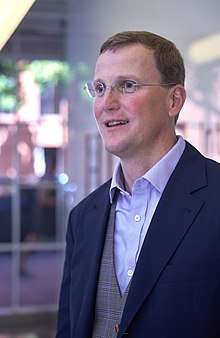Ted Ladd
Dr. Ted Ladd is an American entrepreneur and academic at Harvard University and Hult International Business School.
Ted Ladd | |
|---|---|
 | |
| Nationality | American |
| Education | Wharton School at the University of Pennsylvania Johns Hopkins University Cornell University |
Career
Ladd is the Dean of Research and Professor of Entrepreneurship at the Hult International Business School.[1] Based on its San Francisco campus, he also teaches students on Hult's campuses in Boston, New York, London, Shanghai, and Dubai. He is an instructor on platform entrepreneurship at Harvard University.[2] He was a visitor professor at the Copenhagen Business School and the lead faculty member for social entrepreneurship at the Bainbridge Graduate School, now part of Presidio Graduate School, in San Francisco, California.
Ladd was the Director of Ecosystems at WIMM Labs[3], which built a smartwatch and was acquired by Google as the foundation for WearOS[4]. Ladd was the platform evangelist for Palm Inc. to describe the future of handheld mobile technology. He founded, led, secured funding, sold, or otherwise participated in several other startups.[5]
Ladd is a director of Lower Valley Energy,[6] which serves electricity and natural gas to businesses and residents in northwestern Wyoming, as well as portions of eastern Idaho and southern Montana. He is on the Advisory Board[7] of the Wyoming Small Business Development Center, which is jointly funded by the U.S. federal Small Business Administration, the University of Wyoming, and the Wyoming Business Council. He was a director of the latter from 2003–2009, appointed by Governor Freudenthal and confirmed by the Wyoming Senate. He served as a director of the Community Foundation of Jackson Hole. He was a candidate for Wyoming's sole seat in the U.S. House of Representatives in 2004. Following that race, Ladd was named one of Wyoming 40 under 40[8]
Research
Ladd focuses on the processes by which entrepreneurs design and test new ideas to create new companies, especially as multi-sided platforms (e.g. Lyft and AirBnb). His recent publications include:
- "The Platform Canvas" with Marcel Alleins and Markus Proesch, winner of the Best Conceptual Paper USASBE annual conference [9] and described in Forbes [10]
- "Success and Self-Confidence Through Rejection", TEDxHultAshridge [11]
- "The Limits of Lean", Harvard Business Review [12]
- "The Embedded Enterprise", Stanford Social Innovation Review [13]
- "Customer Development and Effectuation: A Review of Textbooks to Teach a Contemporary Introduction of Entrepreneurship", Management Teaching Review [14]
- “Business Models at the Bottom of the Pyramid: Leveraging Context in Undeveloped Markets.” Proceedings of the Academy of Management Annual Meeting, 2014 [15]
- “How To Reinvent Your Business To Thrive After The Coronavirus” Forbes [16]
A complete list can be found at ORCID.[17]
Awards
- Best Conceptual Paper at the U.S. Association for Small Business and Entrepreneurship annual conference [18]
- Fulbright Scholarship: SyCip Distinguished Lecturing Award in the Philippines [19]
- Research Fellow with the Engaged Practitioner-Scholar program at Case Western Reserve University [20]
- Best Teacher in the Program at Hult: 2015, 2016, 2017, 2018, 2019[21].
- Paper "most relevant to practicing entrepreneurs" at the U.S. Association for Small Business and Entrepreneurship [22]
- Best paper in Social Entrepreneurship at the Academy of Management [23]
Education
Ladd received a PhD in Management from the Weatherhead School of Management at Case Western Reserve University, an MBA from the Wharton School at the University of Pennsylvania, a joint Masters in International Economics with honors from the School of Advanced International Studies (SAIS) from Johns Hopkins University, and a BA from Cornell University.[24][25]
References
- http://www.hult.edu/en/about-us/faculty/ted-ladd/
- https://scholar.harvard.edu/tedladd
- https://www.crunchbase.com/organization/wimm-labs
- https://www.theverge.com/2013/8/30/4677066/google-acquires-android-smartwatch-manufacturer-wimm-labs
- https://leanstartup.co/2016-conference/speaker/ted-ladd/ link
- LV Energy - Board of Directors
- WYEN - Advisory Board
- http://trib.com/business/under-forty-ted-ladd/article_ae3c1648-f65d-59b2-891d-943d002e8e3c.html
- https://www.hult.edu/blog/platform-canvas-dual-degree-win-usasbe/ link
- https://www.forbes.com/sites/tedladd/2020/03/26/how-to-reinvent-your-business-to-thrive-after-corona/#657822c943e2 link
- https://www.youtube.com/watch?v=EWwnddav9Lc&t=11s link
- https://hbr.org/2016/03/the-limits-of-the-lean-startup-method link
- http://ssir.org/articles/entry/the_embedded_enterprise link
- http://mtr.sagepub.com/content/early/2016/03/17/2379298116636636.abstract link
- http://proceedings.aom.org/content/2014/1/10792.abstract?sid=0944b20e-c120-4509-bfb8-2ec732f06e9c link
- https://www.forbes.com/sites/tedladd/2020/03/26/how-to-reinvent-your-business-to-thrive-after-corona/#1871a83c43e2 link
- https://orcid.org/0000-0002-0543-3580 link
- Ted Ladd Concludes Fulbright Distinguished Series in the Philippines
- https://www.hult.edu/blog/professor-year-awards-2017-ted-ladd-phd/
- Weather Head - Ted Ladd Wins Academic Paper Most Relevant to Practicing Entrepreneurs
- Proceedings - Academy of Management
- http://www.tedladd.com
- http://www.hult.edu/en/about-us/faculty/ted-ladd/
.png)